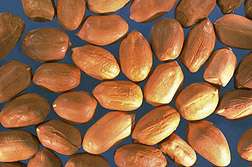Roasting Does More than Enhance Flavor in Peanuts

(PhysOrg.com) -- Agricultural Research Service (ARS) scientists have shown that increasing roast color intensity steadily ramps up the antioxidant capacities of peanuts, peanut flour and peanut skins.
The study was conducted by food technologist Jack P. Davis and his colleagues in the ARS Market Quality and Handling Research Unit in Raleigh, N.C. ARS is the principal intramural scientific research agency in the U.S. Department of Agriculture (USDA).
The researchers characterized changes in antioxidant levels of roasted peanuts and the corresponding blanched skins across an industrially relevant range of roast treatments. For the study, peanuts were incrementally roasted at 362 degrees Fahrenheit from zero to 77 minutes. The water- and oil-soluble antioxidant activity levels of the roasted peanut product samples were then determined.
Dark-roasting consistently increased water- and oil-soluble antioxidant capacities for both commercially available peanut flours and blanched peanuts. Peanut skins, currently considered a waste product of industrial peanut processing, had remarkably high antioxidant capacities across all roast conditions.
These antioxidant increases upon roasting were attributed to greater concentrations of phenolic compounds and/or "browning" reaction products. The latter result from thousands of complex chemical reactions in which proteins and sugars interact, ultimately resulting in brown pigmentation. These reactions, collectively termed Maillard browning, are also thought to contribute in part to the characteristic flavor of roasted peanuts.
The researchers also measured vitamin E in the roasted peanuts. Vitamin E degradation was most rapid in oil from lightly roasted peanuts; however, oil from darker roasted peanuts had better vitamin E retention than that of lightly roasted or even raw peanuts. This preservation of vitamin E could be due to the increased concentration of oil-soluble Maillard reaction products, which seem to protect vitamin E from oxidation.
While darker roasted peanuts are inappropriate for some applications due to sensory considerations, these materials are utilized to prepare, for example, darker roasted peanut flours and flavor extracts. The study expands the fundamental knowledge of roasting as it relates to the antioxidant capacity of peanuts and peanut ingredients, according to the authors. Davis reported the findings in Food Chemistry.
Provided by USDA Agricultural Research Service

















